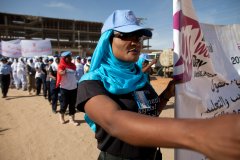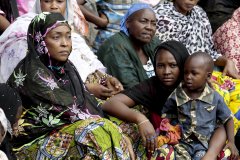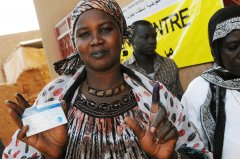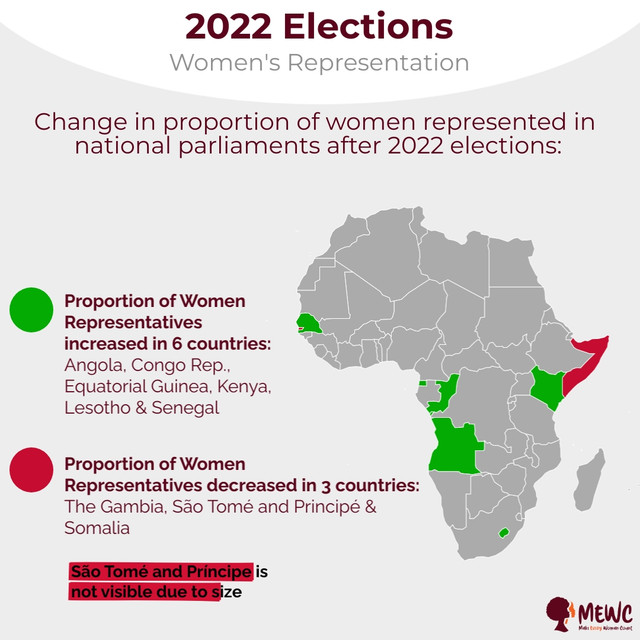Gender Issues Showlist
Women, Peace & Security
UNSCR 1325 calls on all parties to: protect and respect the rights of women and girls in conflict & post-conflict; increase women participation in all conflict resolution, peacekeeping and peace-building & to end impunity by prosecuting perpetrators of sexual and other violence on women and girls
index.php?option=com_content&view=category&id=56&Itemid=1913
Human Rights of Women
Thirty six years after the adoption of CEDAW, many women and girls still do not have equal opportunities to realize rights recognized by law. Women are denied the right to own property or inherit land. They face social exclusion, “honor killings”, FGM, trafficking, restricted mobility, early marriage,...
index.php?option=com_content&view=category&id=44&Itemid=1908
Violence Against Women
Violence against women is the most shameful human rights violation. Gender based violence not only violates human rights, but also hampers productivity, reduces human capital and undermines economic growth. It is estimated that up to 70 per cent of women experience violence in their lifetime
index.php?option=com_content&view=category&id=69&Itemid=1912
Political Participation & Leadership
Where women are fully represented, societies are more peaceful and stable. Women political participation is fundamental for gender equality and their representation in positions of leadership must be a priority for all Africans governments.
index.php?option=com_content&view=category&id=65&Itemid=1911
Latest News
- COTE D'IVOIRE: South-South Meeting to Promote Gender Equality and Combat Deforestation
- RWANDA: Rwanda Set to Launch Cervical Cancer Elimination Plan
- NIGERIA: Over 5,000 Nigerian Women Stranded in Iraq - Govt
- SUDAN: Healthcare Collapse Threatens Pregnant Women in Sudan's Sharg El Nil
- GHANA: President Nominates 12 More Ministers
- Senegal: Parliamentary election 2024
- Mauritius: Parliamentary election 2024
- Ghana: Presidential and Parliamentary Elections
- Botswana: Parliamentary elections 2024
- Algeria: Presidential Election 2024
GAMBIA: Time To Drop The Knife For FMG In The Gambia
Source: NGO News Africa
Women’s rights activists in the Gambia are insisting that more than 30 years of campaigning to raise awareness should be sufficient to move the government to outlaw female genital mutilation (FMG).
The practice remains widespread in this tiny West African country of 1.8 million people, but rights activists believe that their campaign has now reached the tipping point.
Two years ago, GAMCOTRAP, an apolitical non-governmental organisation (NGO) committed to the promotion and protection of women and girl child, political, social, sexual, reproductive health and educational rights in The Gambia, and one of the groups behind the anti-FGM campaign, sponsored a draft bill which has been subjected to wide stakeholder consultations.
Several previous attempts to legislate against FGM have failed, with no fewer than three pro-women laws having had clauses on FGM removed from draft bills. But activists now appear determined to make the final push and hope that when introduced this time round, the bill will go through.
The time has now come for final action, says Amie Bensouda, legal consultant for the draft bill. There can be no half measures. The law has to be clear. It proposed by the law that FGM in all its forms is prohibited. This discussion cannot go on forever. The government should do what is right.
The campaign has reached its climax, Dr Isatou Touray, executive director of GAMCOTRAP, told IPS. A lot of work has been done. I am hopeful of having a law because women are calling for it, men are calling for it. I know there are pockets of resistance but that’s always the case when it comes to women’s issues.
In 2010, we organised a workshop for the National Assembly she continued. They made a declaration, pledging to support any bill that criminalises FGM. I am happy to report that, since 2007, more than 128 circumcisers and 900 communities have abandoned the practice. This trend will continue to grow.
Seventy-eight percent of Gambian women undergo FGM as a rite of passage. However, after more than three decades of the anti-FGM campaign in Gambia, a wind of change is blowing, sweeping even conservative rural communities.
Sustained awareness-raising programmes have resulted in public declarations of abandonment of FGM by hundreds of circumcisers. Babung Sidibeh, custodian of the tradition in her native Janjanbureh, the provincial capital of Central River Region, 196 kilometres from Banjul, was one of them. The old woman assumed the role after the death of her parents, but she has since dropped the knife, as no longer practising FGM is known here.
Sidibeh did so after receiving training in reproductive health and women’s rights. Soon after we circumcised our children in 2011, she told IPS. Gamcotrap invited me for training. I was exposed to the harm ve been doing to our fellow women. If I had known that before what I know today, I would never have circumcised anyone.
With a tinge of remorse, she added: Weâve caused lots of suffering to our women. That’s why I told you that if my grandparents had known what I know today, they would not have circumcised anyone. Ignorance was the problem.
Mrs Camara-Touray, a senior public health worker at the country’s heath ministry confirmed to IPS that her ministry has since taken a more proactive role on FGM.
She explained: The ministry has created an FGM complication register. We have also trained nurses on FGM. Until recently, when you asked most health workers about the complications that can arise with FMG, they would say it has no complications. That’s because they were not trained. Since 2011, we have changed our curriculum to include these complications. After we put the register in place, within three months, we go to a region and see that hundreds of complications due to FGM had been recorded.
In March, Gamcotrap organised a regional religious dialogue that sought to de-link FGM from Islam. Touray said that the workshop was a prelude to the introduction of the proposed law in parliament.
Islamic scholars were brought together from Mali, Guinea, Mauritania and Gambia,mshe told IPS. We had a constructive debate and it was overwhelmingly accepted that FGM is not an Islamic injunction, it’s a cultural practice. It was recommended that a specific law should be passed and a declaration was made to that effect.
However, there is resistance in some quarters. An influential group of Islamic scholars, backed by the leadership of the Supreme Islamic Council, continue to maintain that FGM is a religious injunction.
With a large following and having the ears of the politicians, these clerics have in recent times also intensified their pro-FGM campaign.
It will be a big mistake if they legislate against FGM, Ebrima Jarjue, an executive member of the Supreme Islamic Council, told IPS.
Our religion says we cut just small. We should be allowed to practise our religion. If some people are doing it and doing it bad, let them stop it. Let them go and learn how to do it. If circumcising the girl child when she is young is causing problems, then let’s wait until she grows up. That’s what used to happen.
Meanwhile, the Women’s Bureau, the implementing arm of the Ministry of Women’s Affairs, is hesitant about legislating against FGM.
As far FGM is concerned, the position of the Women’s Bureau is that there’s need for more sensitisation and dialogue to push the course forward, Neneh Touray, information and communication officer of the Women’s Bureau, told IPS. She declined to comment on whether the bureau thought that the bill was premature.





